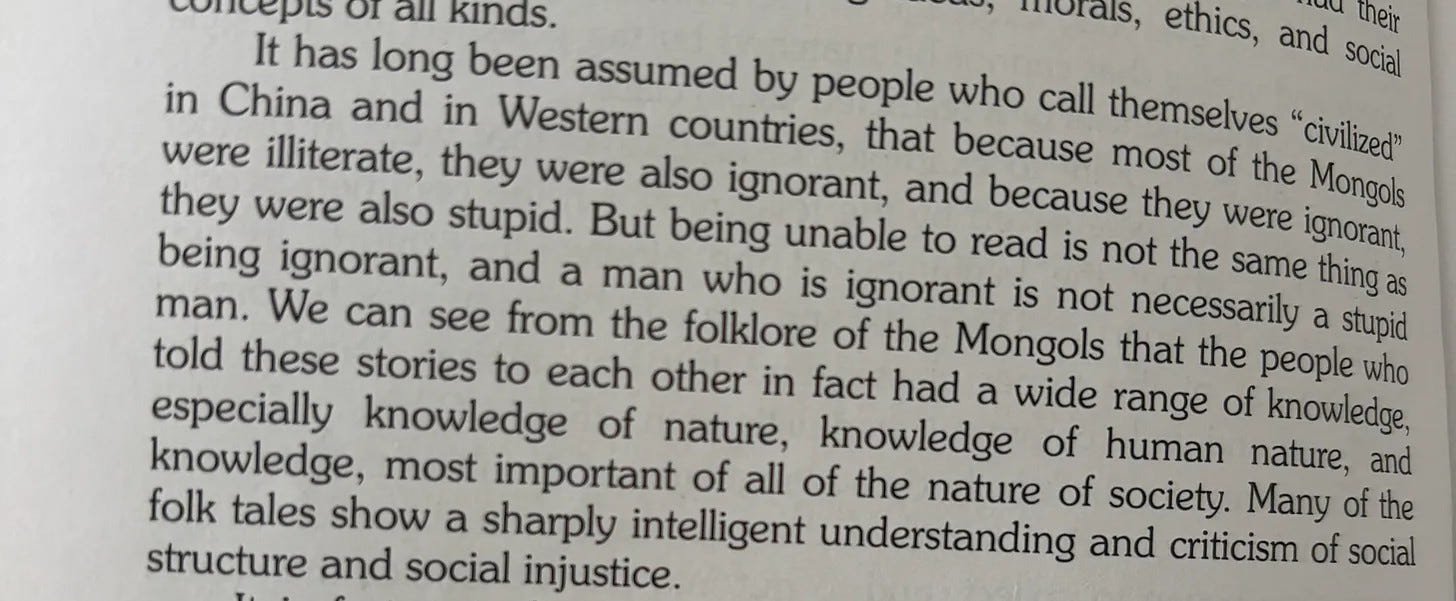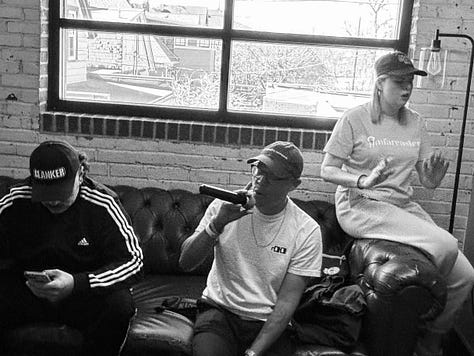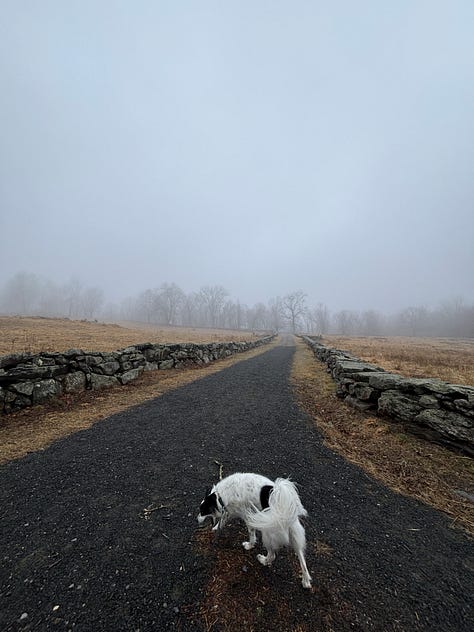Back to Mongolia, AI Bot Update, Parenting in 2025
Welcome to the 50th entry of my public journal, where I share *some of the things* I've been exploring across work, tech, wellness, and life.
Dear Friends
This post (my 50th!!) covers my reflections on planning an upcoming trip to western Mongolia, updates from my ongoing AI bot project, and thoughts on parenting in 2025. You'll also find my usual roundup of interesting links and recent photos.
It's a long one, so feel free to read what resonates and skip the rest.
Adrienne
Nomads, AI, and Knowledge We Can't Digitize
I made travel arrangements to visit the Altai Mountains in western Mongolia this coming September. We'll be staying with Kazakh nomads and joining them for an eagle-hunting festival and a two-day horse trek. We'll sleep in a ger (Mongolian yurt) for 13 nights, sharing one portable toilet and one makeshift shower with a group of about 20 people. I assume I’ll be without cell phone service.
There are two reasons I keep getting pulled to Mongolia. The first is connecting with the culture of some of my ancestors. The second is that the faster our Western society changes and advances technologically, the more I find myself wanting to balance it by stepping back in time, deep into remote areas where people continue living as they have for thousands of years.
Recently, I attended the annual board meeting for the Jeweled Horse Foundation. One of our stated goals is helping to preserve the nomadic way of life in Mongolia. While there are plenty of other nonprofits supporting Mongolians, many are missionary organizations that seek to spread Christianity. Our organization is different. It's important to us that we help preserve nomadic life without attempting to convert or change Mongolian culture.
As we discussed our preservation goals, I found myself reflecting on the rapid explosion of AI, which is quickly making all collective human knowledge widely accessible (an astonishingly incredible feat, IMO). But what about all the knowledge in the world that isn’t digitized, knowledge that cannot be captured by an LLM? I began thinking specifically about how nomads live harmoniously with their animals, deriving sustenance from milk, meat, and hide. They make a large variety of cheeses, yogurts, and fermented drinks. They make wool, felt, and textiles. And using humane slaughter techniques, utilize whole animals without waste. Their entire way of life—from transportation and leisure to daily survival—is built around harmony with their five traditional herding animals: goats, sheep, camels, horses, and yaks. This knowledge isn’t taught in school or textbooks. It’s passed directly from father to son, mother to daughter, from generation to generation.
I'm reminded of a passage from the introduction of a book of Mongolian folktales, emphasizing how “civilized” societies often undervalue unwritten knowledge:
“… assumed by people who call themselves “civilized” […], that because most of the Mongols were illiterate, they were also ignorant, and because they were ignorant, they were also stupid. But being unable to read is not the same thing as being ignorant, and a man who is ignorant is not necessarily a stupid man. [...] [the Mongols] had a wide range of knowledge, especially knowledge of nature, knowledge of human nature, and knowledge, most important of all, of the nature of society.” - Owen Lattimore

I’m not entirely sure how to tie all these reflections neatly together, but I believe there’s something important here:
AI is everywhere, reshaping our world at a pace so rapid that we can’t fully anticipate its consequences. While I'm generally optimistic that AI will ultimately be a net positive, contributing to global abundance, it also risks flattening and merging diverse world cultures into something increasingly homogeneous. Doesn’t it already seem that major cities across the developed world feel quite similar to each other?
As this homogenization accelerates, preserving distinct cultures and traditional ways of life becomes even more urgent. People building AI probably aren’t thinking about nomads and their unique wisdom. Without firsthand experience with the nomads six years ago, I wouldn’t have understood or valued this perspective.
My time spent with the nomads got me to appreciate and recognize the importance of their traditional knowledge. My fear is that if we lose these ancient ways of life, we’ll also lose essential wisdom that even the most sophisticated AI could never replicate.
AI Bot Updates
I’m continuing to build my AI bot and learning a lot as I go. I’ll share recent updates, learnings, and what’s next on the roadmap.
Change Log
Refactored the code to use the "messages" array in the chat completions API instead of the previous "one massive prompt" approach. Conversation history between the user and bot now passes through as messages instead of being injected directly into the prompt.
Implemented 'user', 'assistant', and 'developer' roles in the chat completions API to improve response quality.
Set the max_token_count for responses to 200 tokens, limiting reply length. Previously, I didn't know this setting existed and struggled to prompt the AI into giving short enough responses.
Moved the bot's FID into an environment variable instead of hardcoding it.
Learnings
This is my first AI project and my first hands-on dev project in a looooong time. I grew up with deterministic algorithms, which produce consistent outputs from identical inputs. AI’s non-deterministic nature requires a major mindset shift.
With AI copilots, APIs, and open-source libraries, it's remarkably easy to build an MVP quickly (5 days). However, moving from viable to good takes much more effort (I’m on 4 months and still going lol). And progressing from good to great is even harder - we’ll see if I can ever get my bot there.
There were countless rabbit holes I could have gone down, and if I had pursued them all, I might never have shipped anything. I had to remain disciplined in defining the "minimum" in MVP and be satisfied shipping when the bot was "good enough," knowing it's easier to iterate and improve later rather than striving for perfection upfront. Keeping code modular helps significantly because you can revisit and enhance various components later.
Also, it's important to accept help from others, but equally important to know which advice to ignore. No one has all the answers because it's all so new.
Roadmap
The next major feature I'm adding is the bot’s ability to answer questions based on specific episode transcripts. I started this last week, and it's proven more difficult than anticipated. After chatting with another developer building AI agents, I had an "aha" moment:
I realized there are three dimensions determining the quality and usefulness of GMFC101:
Capabilities: These are the different question types the bot can handle. Each new capability increases workflow complexity, involving more prompts, additional data sources, RAG, etc. Initially, the bot could only answer user questions by searching all past transcripts. It couldn’t answer general show questions (like "When was the first episode?") or questions about specific episodes ("What were the highlights of the Clanker episode?").
Personality: This refers to how the bot answers and involves prompt engineering.
Conversation: The bot’s ability to naturally interact with users through back-and-forth conversations.
When I launched the first MVP a few months ago, I felt pretty good about all three elements. The bot had a decent personality, could effectively answer questions and link relevant past episodes, and could interact fairly naturally. Later, I shifted my focus to adding new capabilities, like answering show-related questions by searching show metadata instead of transcripts. While this new workflow router worked, I noticed its personality and conversational ability declined slightly. Last week, as I began developing the capability to retrieve transcripts for specific shows, I noticed an even sharper drop in personality and chat quality. Clearly, adding more capabilities seemed to degrade the bot’s overall quality.
This realization initially overwhelmed me, thinking about how much additional development work was needed before deploying new features. But this morning, something clicked that got me unstuck: I can temporarily remove the chat functionality to simplify my development process. By focusing only on providing solid answers first, I reduce complexity significantly. People don't necessarily need the bot to hold lengthy conversations right now; it can simply answer individual questions. Once satisfied with its accuracy, I can gradually layer personality and conversational abilities back in. Although this might sound obvious, it was a significant moment of clarity for me, and I'm now excited to move forward.
TL;DR: Adding new capabilities to GMFC101 has inadvertently reduced its personality and conversational quality, and attempting to fix everything at once felt overwhelming. To move forward, I'll temporarily remove the chat functionality, simplifying development. I'll focus first on providing solid answers, then gradually reintroduce personality and conversation later.
On parenting in 2025
I think a lot about how to prepare my kids for the future. My generation grew up believing in a simple recipe for success:
Get good grades, get into a good college, get a good job, climb the career ladder, and you’ll be set for life.
About a decade ago, I realized this is no longer how the world works. I began to believe that the key to success is prioritizing skills over credentials. The college your degree came from didn't matter nearly as much as having skills that were in demand. The reason for this shift is that the half-life of skills (the time it takes for a skill to become obsolete) has become shorter and shorter. The skills you learn today likely won’t be relevant a few years from now. For example, when I learned to code in Visual Basic and SQL Server, I easily landed high-paying jobs in the early 2000s. But by 2005, finding a good job meant learning entirely new programming languages.
As a parent, I've wanted my kids to learn practical, useful skills. I pushed STEM subjects because they offer concrete, hard skills - there will always be jobs for scientists and engineers, right?
But there’s another big shift underway, and I no longer think focusing solely on hard skills is enough. AI is quickly reaching a point where it can handle many IQ-focused technical tasks for us, making purely technical skills less of a differentiator. Instead, the most valuable skills of the future will be broader, meta-skills with a stronger emphasis on emotional intelligence and adaptability.
Here are a few of these meta-skills I want my children to develop:
A love of learning and natural curiosity
Self-confidence and agency: believing they can learn anything and do anything if they choose to
A practical business sense and an understanding of markets
A positive-sum mindset: creating new things, trying new ideas, embracing change, and not getting overly attached to the past
I live in a suburb of NYC, where my kids attend a public school full of high-achieving students. Many kids here take all AP and college level courses, get straight A's and high SAT scores, and get accepted to top-20 universities, often with help from private tutors and private college counselors. This focus on academic achievement, measured by grades and college rankings, seems to create high levels of anxiety among both kids and parents.
While academic rigor is important, I'm much more focused on helping my children build meta-skills that prepare them for an unpredictable future than on having them get straight A's.
I don’t know whether I’m preparing them the right way for our uncertain future, only time will tell, but I am listening to my gut on this one and choosing to not follow the herd.
Some of the (other) links
I received $2500 for International Women’s Day and I was determined to pay it forward
I joined a Farcaster angel investing group last year called Crossroads and we just launched a website.
Speaking of angel investing, I liked how Mario Gabriele listed the many good reasons one might get into angel investing, and the one bad one in his recent
guide to angel investing: “Some good ones: you get to learn from great founders, meet interesting people, discover new technologies early, build a valuable network, hone your investing abilities, and burnish a reputation. A bad one: you hope to make life-altering money.”
AI is getting more conversational - you can cross the uncanny valley and play with it here.
When was your last digital hygiene checkup? Andrej Karpathy came out with a new post with a checklist that’s worth going through.
Some of the pics
Top row: images from ethdenver
Middle row: walking in our nearby state park as winter ends
Bottom row: artichoke as an after school snack and a sunday pancake brunch








A Note to My Readers
I started this substack in December 2022 as an experiment to see if developing a writing habit would help clarify my thinking and/or provide other benefits. You can read about my original intentions in my first post or my more recent reflections after sticking with it for a year.
I write about twice a month and share musings, meditations, and links to things I’m finding interesting as I build out a farcaster-native media company, a modern technology consulting company, raise my kids, and have fun creating and learning in the worlds of crypto, tech, finance, science and wellness.
Thank you for supporting my writing and journey. If you’d like to get in touch you can reply to me here or find me on X and farcaster.
Until next time, keep putting good into the world. —adrienne🌏❤️

